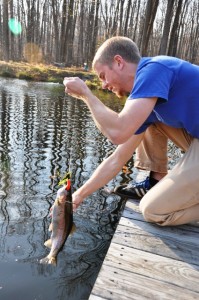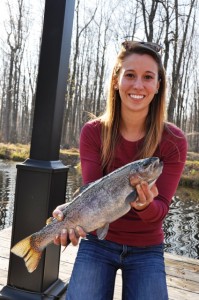By Michele Tallarita ’12
A group of students from diverse majors is working to make a local fish farming operation more economically and environmentally efficient.
The students are members of Technology Clinic, a hands-on course founded in 1987 that combines various student expertise and talents to help solve real-world problems of a business, nonprofit, or government body.

Benjamin Drake ’14 pulls a catch out of the water.
“Tech Clinic is an initiative that draws across majors and disciplines and finds students who know how to cross-train their brains, think creatively about real-life challenges, and collaborate effectively,” says Shehtaz Huq ’14 (Garland, Texas), a double major in film & media studies and English. “Since so many of our students are leaders and initiators in their own right, it is sometimes a challenge to step back and let someone else take the reins—which is what I’ve learned to accept as an integral part of teamwork.”
The team is continuing a project that began last year on the fish-farming operation of David Due in Roseto, Pa. Areas of exploration for improving the pond, which Due has owned for more than 30 years, are both technical and marketing based.
For example, the students are looking to enhance the pond’s mechanisms for aeration, temperature control, and fending off predators. They also are seeking out alternative markets for the fish. This semester, they assessed the viability of supplying to farm-to-table restaurants, forming a recreational fishing pond, and partnering with Bangor Area High School to provide fingerlings to classrooms.
“We want to make sure the Country Springs Farm’s investment returns profits for the Dues and also to ensure that the farm has the potential to become a financially feasible business,” says Huq.
Benjamin Drake ’14 (Spring Lake Heights, N.J.), an electrical and computer engineering major who plans to work in the field after graduation, has found the experience of taking on a real-world problem both rewarding and helpful in preparing him for his future career.

Brooke Kohler ’13 at the Dues’ fish farm
“Labs and group projects assigned in class are good experience, but it’s different when there is a customer who will be benefiting from your work, not a teacher giving you a grade,” he says. “I definitely feel this experience has helped me to interact with a team and accomplish a proposed task.”
For Huq, who wants to attend graduate school, working with other students on a project for an extended period has prepared her for the graduate atmosphere. She has also been surprised by the ability of students from various academic backgrounds to work as a cohesive group.
“Initially, I thought the six of us would not have much in common,” she says. “Our Tech Clinic has a varsity pole vaulter, an avid soccer player, a female computer science major, and a theater technician…Once we got talking, though, we realized that we are all highly driven and motivated and engaged in what goes on around us,” she says.
Other team members include Ian Crawley ’15 (Doylestown, Pa.), a double major in math and physics; Brooke Kohler ’13 (Flemington, N.J.), an anthropology & sociology major; Franceska Xhakaj ’15 (Vlore, Albania), a computer science major; and Yue Yin ’14 (Shanghai, China), a chemical engineering major. The faculty advisers are Dan Bauer, professor emeritus of anthropology and sociology, and Nancy Waters, associate professor of biology.

